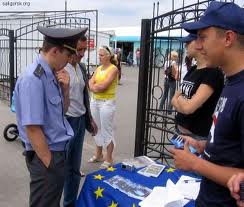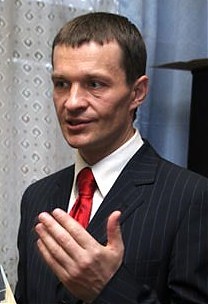In Belarus, actively collecting signatures is something of a novelty. Relatively unrestricted campaign activists were able to set up tents and tables on main streets and squares practically in every city.
The number of potential candidates is one more striking feature of the current campaign. Originally 17, it has now been reduced to 14. Still there are more than ever.
Besides Lukashenka, nine more candidates have claimed collecting ‘a magic number’ of autographs up to date.
One of the contenders Siarhei Ryzhou accused the authorities of harassing his campaign office members and withdrew from the campaign. Meanwhile, representatives of the HR defenders for Free Elections campaign were trying to find evidences of persecutions. Mr Ryzhou failed to produce any concrete facts. Observers were also unable to obtain any information about his complaints being filed to competent authorities.
Equal opportunities
The authorities cite the fact that opposition candidates are able to freely collect signatures as ‘a liberal trend’ in the Belarusian political system. Yet independent observers have enough violations registered to prove theses claims being largely declarative.
An activist Siarhei Ulasau, working for one of the opposition candidate, encountered very real obstacles on his way to collect signatures. Rather aggressive youth used physical force to intimidate him when Mr Ulasau was doing door-to-door campaigning. Fearing for his well being and health the activist had to literally run for his life.
Tatsiana Seviarynec, a coordinator with Belarusian Chiristian Democracy, was able to report this incident to observers. In retrospect, she believes that it would have been better to call police and have hooligans arrested, rather than trying to tame the belligerent youth.
In Viciebsk activists, collecting signatures, had to call for police help on several occasions. Andrei Liadouski, beaten by unknown drunk individuals, and Alena Auchynnikava, who was harassed by an elderly supporter of Lukashenka, are still waiting to any formal response from police about criminal acts committed against them. On the other hand, activists who called police and had hooligans arrested will be witnesses in a court hearing scheduled for 28 October.
Ales Halavan, who collects signatures for three opposition candidates, was arrested on 19 October on his way home.
Police officers claimed that Mr Halavan was a suspect in a criminal investigation and insisted that he took a test on alcohol intoxication. The test showed him as completely sober, after that the activist was taken to a precinct.
Tam ara Karyzna, a fellow activist, thinks that Mr Halavan was detained for his work in this election campaign. He was collecting signatures around the Połack market place using a national white-red-white flag detested by the authorities. As the flag presence attracted considerable public attention, perhaps police decided to react to stop Mr Halavan.
ara Karyzna, a fellow activist, thinks that Mr Halavan was detained for his work in this election campaign. He was collecting signatures around the Połack market place using a national white-red-white flag detested by the authorities. As the flag presence attracted considerable public attention, perhaps police decided to react to stop Mr Halavan.
Exploitating school teachers and doctors
In the mean time, HR defenders registered a considerable number of the Electoral Code violations. Obviously, those violations were not committed by the opposition candidates as one warning by CEC could be the last one for them.
Hanna Shakhnovich, Chair of the Bokšycy Rural Executive Committee (Słuck District, Minsk Region), who is not a member of Lukashenka’s initiative group, was personally collecting signatures in support of the incumbent president by visiting some villages of the Bokšycy rural community.
In Babrujsk City Polyclinic No. 7, signatures were collected during examination of patients in the x-ray laboratory. Moreover, according to residents of micro-district-6 of Babrujsk, those ready to support Lukashenka could be examined out of turn.
In Minsk secondary school No. 1 each teacher was ordered by the principle to bring 16 signatures for Lukashenka.
 The principle did not care where and how school teachers were supposed to get those signatures. A lawyer Aleh Vauchak is certain that the school master committed a crime by acting outside of her professional duties.
The principle did not care where and how school teachers were supposed to get those signatures. A lawyer Aleh Vauchak is certain that the school master committed a crime by acting outside of her professional duties.
“School administrators are forcing its employees to fulfil somebody else’s will. Signatures collected in that fashion should be discarded by election authorities. Moreover, Article 61 of the Electoral Code clearly stipulates such activities of the administration or any other individuals, who are not members of candidates’ initiative groups, as criminal and should be penalised. Obviously, for any legal action to start school teachers should have logged an official complaint with CEC. For apparent reasons it did not happen,” Mr Vouchak commented.
The current signature collection serves as a test to check how transparent, fair and free the entire presidential campaign will be. Unfortunately, comparing with 2006 no significant and fundamental changes have been made. The authorities are still discriminating against alternative and independent candidates. The regime uses a ‘what I can do, you may not’ principle.
Based on spring96.org, charter97.org, Narodnaja Vola/Народная Воля





